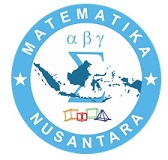PENGARUH MODEL PEMBELAJARAN CORE TERHADAP KEMAMPUAN BERPIKIR KRITIS DAN DISPOSISI MATEMATIS DITINJAU DARI KEMAMPUAN AWAL MATEMATIKA SISWA SMA NEGERI DI JAKARTA TIMUR
Abstract
ABSTRACT
The study aims to see the effect of CORE instruction methods toward mathematical critical thinking ability and mathematical dispositions of high school students in East Jakarta. Samples of this research is 88 students 11th grade Science Major from SMA Negeri Jakarta Timur. Research methods is quasi experiment using treatment by level design. Data collection were using instruments of test and questionnarie test: mathematics prior knowledge and mathematical critical thinking ability test, and mathematical dispositions questionnaire test. Data analaysis is using two way ANOVA. Results indicated that: (1) Mathematical critical thinking ability and mathematical dispositions of students treated by CORE instruction is higher than students treated by Direct Instruction, (2) There is an interaction between learning models and mathematics prior knowledge (KAM) that have significant effect toward mathematical critical thinking ability and students mathematical dispositions, (3) Mathematical critical thinking ability and mathematical dispositions of students with high KAM treated by CORE instruction is higher than students with high KAM treated by Direct Instruction, (4) There is no significant effect of learning models toward mathematical critical thinking ability and mathematical dispositions of students with low KAM.
Keywords: CORE Instruction, Mathematical Critical Thinking Ability, Mathematical Dispositions, Mathematics Prior Knowledge
Full Text:
PDFReferences
Abrami, Philip C., et al. (2015). “Strategies for Teaching Students to Think Critically: A Meta-Analysis.” Review of Educational Research, Vol. 85, No. 2, pp. 275-314.
Badjeber, Rafiq. (2017). “Asosiasi Kemampuan Penalaran Matematis dengan Kemampuan Koneksi Matematis Siswa SMP dalam Pembelajaran Inkuiri Model Alberta.” Jurnal Penelitian Pembelajaran Matematika, Vol.10, No.2, pp.50-56. Tersedia pada: http://jurnal.untirta.ac.id/index.php/JPPM/article/view/2030/1572.
Bakry, Md Nor Bin Bakar. (2015). “The Process of Thinking among Junior High School Students in Solving HOTS Question.” International Journal of Evaluation and Research in Education, Vol. 4, No. 3, pp. 138-145.
Beyers, James. (2011) “Development and Evaluation of an Instrument to Asses Prospective Teachers’ Disposition with Respect of Mathematics.” International Journal of Business and Science, Vol. 2, No. 16, pp. 20-32.
Curwen, Margaret Sauceda., et al. (2010). “Increasing Teachers’ Metacognition Develops Students’ Higer Learning during Content Area Literacy Instruction: Finding from Read-Write Cycle Project.” Issues in Teacher Education, Vol.19, No.2, pp. 127-151.
Dochy, Philip., et al. (2002). “Cognitive prerequisites and Learning.” Active Learning in Higer Education, Vol. 3, No. 3, pp. 265-284.
Facione, Peter A. (2015). “Critikal Thingking: What It Is and Why It Counts.” Online. http://www.insightassessmen t.com/pdf_files/what&why2006.pdf. (Diakses 12 September 2017, pukul 20.10).
Haeruman, Leni Dhianti. (2017). “Pengaruh Model Discovery Learning Terhadap Peningkatan Kemampuan Berpikir Kritis Matematis dan Self-Confidence Ditinjau dari Kemampuan Awal Matematika Siswa SMA di Bogor Timur.” Jurnal Penelitian Pembelajaran Matematika, Vol.10, No.2, pp.157-168. Tersedia pada: http://jurnal.untirta.ac.id/index.php/JPPM/article/view/2040/1582.
Hailikari, Telle & Lindblom-Ylanne, Sari. (2008). “The Relevance of Prior Knowledge in Learning and Instructional Design.” American Journal of Pharmaceutical Education, Vol. 72, No. 5, pp. 1-8.
Kusmanto, Hadi. (2014). “Pengaruh Berpikir Kritis Terhadap Kemampuan Siswa Dalam Memecahkan Masalah Matematika.” Jurnal EduMa Vol. 3 No. 1 Juli 2014. Cirebon: IAIN Syekh Nurjati.
Kilpatrick, Jeremy., et al. (2001). Adding It Up: Helping Children Learn Mathematics. Washington, DC: National Academy Press.
Letseka, Moeketsi & Zireva, Daviso. (2013). “Thinking: Lesson from John Dewey’s How We Think.” Academic Journal of Interdisciplinary Studies, Vol. 2, No. 2, pp.51-60.
Mandur, Kanisius., et al. (2013). “Kontribusi Kemampuan Koneksi, Kemampuan Representasi dan Disposisi Matematis Terhadap Prestasi Belajar Matematika Siswa SMA Swasta di Kabupaten Manggarai.” Journal Penelitian Pascasarjana UNDIKSHA, Volume 2 Tahun 2013. Bali: Universitas Pendidikan Ganesha.
Mata, Maria Lordes., et al. (2012). “Attitude toward Mathematics: Effect of Individual, Motivational, and Social Support Factors.” Online. http://dx.doi.org/10.1155/2012/876028. (Diakses 7 Desember 2016, pukul: 21.05).
OECD. (2016). “PISA 2015 Results in Focus.” Online. www.oecd.org/pisa. (Diakses 11 Agustus 2016, pukul: 20.25).
Purbaningrum, Kus Andini. (2017). “Kemampuan Berpikir Tingkat Tinggi Siswa SMP dalam Pemecahan Masalah Matematika Ditinjau Dari Gaya Belajar.” Jurnal Penelitian Pembelajaran Matematika, Vol.10, No.2, pp.40-49. Tersedia pada: http://jurnal.untirta.ac.id/index.php/JPPM/article/view/2029/1571.
Rahayu, R., Kartono. (2014). “The Effect of Mathematical Disposition toward Problem Solving Ability based on IDEAL Problem Solver.” International Journal of Science and Research, Vol. 3, No. 10, pp.1315-1318.
Saija, Loise M. (2012). “Analyzing the Mathematical Disposition and Its Correlation with Mathematics Achievement of Senior High School Students.” Infinity Jurnal Ilmiah Program Studi Matematika STKIP Siliwangi Bandung, Vol. 1, No. 2, pp. 148-152. Bandung: STKIP Siliwangi.
Yulistiyani, Indah. (2014). “Pengaruh Kemampuan Berpikir Kritis dan Kreativitas Belajar Terhadap Prestasi Belajar Akuntansi pada Siswa Kelas XI IPS SMA Negeri 1 Banyudono Tahun Pelajaran 2013/2014.” Skripsi. Surakarta: Universitas Muhammadiyah Surakarta.
Yumiati. (2015). “Meningkatkan Kemampuan Berpikir Aljabar, Berpikir Kritis Matematis, dan Self-Regulated Learning Siswa SMP melalui Pembelajaran CORE: (Connecting, Organizing, Reflecting, dan Extending).” Tesis. Bandung: Universitas Pendidikan Indonesia.
DOI: http://dx.doi.org/10.30870/jppm.v11i1.2997
Refbacks
- There are currently no refbacks.
Copyright (c) 2018 Jurnal Penelitian dan Pembelajaran Matematika
Ciptaan disebarluaskan di bawah Lisensi Creative Commons Atribusi 4.0 Internasional .
JPPM (Jurnal Penelitian dan Pembelajaran Matematika). Jurnal ini diterbitkan oleh Jurusan Pendidikan Matematika FKIP Universitas Sultan Ageng Tirtayasa (cetak) dan Jurnal Untirta (eprint).
Alamat Penerbit: Jl. Raya Ciwaru No 25 Kota Serang Banten, Jurusan Pendidikan Matematika, Fakultas Keguruan dan Ilmu Pendidikan, Universitas Sultan Ageng Tirtayasa, Kampus Ciwaru, Serang, Banten, Indonesia. Telepon / Faks: (0254) 280330 Ext 111, Email: [email protected] |Klik untuk mengakses: Jurnal Penelitian dan Pembelajaran Matematika


